National Youth Day is celebrated on 12th January being the birthday of Swami Vivekananda. In 1984, the Government of India declared this day as a National day and it is celebrated since then. It is a belief of Indian government that the philosophy of Swamiji and the ideals for which he lived and worked could be a great source of inspiration for the Indian youth. The National Youth Day is observed all over India at schools and colleges with procession, speeches, seminars, competitions etc.
Indian National Bar Association on 12th January, 2021 amid the pandemic organized this day for students to motivate and guide them on the process to evolve in the online regime. The summit witnessed Speakers and Guests from all professional arenas, Honorable judges, Legislators, Civil servants, Advocates, Psychologists, Medical counsellors etc.
INAUGURAL SESSION
Host- Shri Kaviraj Singh, Secretary General, INBA
Speaker – Shri P K. Malhotra, Former Secretary, Ministry of Law and Justice
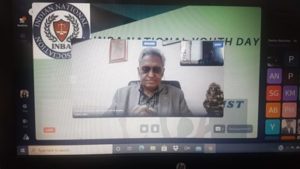
Shri P K. Malhotra is a distinguished person who has more than forty years of experience in the fields of law which he has held in different capacities and more than twenty-five years’ of experience as an officer in the Ministry of Law and Justice. He graciously held the position of Secretary, Ministry of Law and Justice from December 2012 to April 2016 and was an ex-officio member of the Law Commission during the same period. During his tenure as the Secretary, he played a key role in finalizing important legislations of the nation as well as represented India in various international forums.
Shri Kaviraj Singh gave an introductory remark by stating the purpose for organizing the very first National Youth Summit by INBA that how youths are playing a key role in the development of society and the nation and also the dire need to provide quality guidance at these trying times. He then introduced the esteemed speaker to all the attendees and how he, Shri P K. Malhotra, has been instrumental in being the torch bearer to the youths and providing assistance to INBA, in times of need.
Shri P K. Malhotra began by acknowledging the efforts put forth by Shri Kaviraj Singh and the whole team at INBA to organize this illustrious summit. He even expressed his ecstasies after getting to know that the vast number of attendees are youngsters that even students. Shri P K. Malhotra reminded the venerable gathering that today marks the birth anniversary of Swami Vivekananda who was born on 12th of January, 1863 at Calcutta and how at a very young age he had illuminated the ‘Parliament of the World’s Religions’ at Chicago in the year 1893 with the electrifying words, “Sisters and Brothers of America…”. The impact of the words was so astounding that the whole august gathering gave more than two minutes of applause. During this journey of his, he had introduced the Indian Vedanta and Philosophies of Yoga to the World and later went on to be the founder of ‘Ramakrishna Mission’, named after his guru, mentor and guide. Looking at the contributions and sacrifices Vivekananda had made for the mankind, Government of India, in the year 1985, declared 12th January as the ‘National Youth Day’. Shri P K. Malhotra then appreciated INBA for organizing this summit and discuss the pressing issues concerning the youth. In the contemporary times, it is pertinent for the youth to be aware and educated which will only pave the way to an honourable and dignified life. He even highlighted that India has more than 50% of its population below the age of 25 years and more than 65% below the age of 35 years. The youths of India have been instrumental, as he exclaimed, in providing key solution at times of crisis and should also endeavour through different ways to contribute to the society. He even enlightened the audience with some of the notable quotations by Swamiji himself through his different speeches-
“Talk to yourself once in a day, otherwise you may miss meeting an intelligent person in this world.”
“You cannot believe in God unless you believe in yourself.”
“You have to go from the inside out, none can teach you, none can make you spiritual, there is no other teacher but your own soul.”
“Take up one idea, make that one idea your life. Think of it, dream of it, live on that idea. Let the brain muscles, nerves and every part of your body be full of that idea and just leave every other idea alone. ”
“Learn everything that is Good from Others, but bring it in, and in your own way absorb it; do not become others.”
“Take risk in your life; if you win, you lead; if you loose, you guide.”
“Condemn none: if you can stretch out a helping hand, do so. If you cannot, fold your hands, bless your brothers, and let them go their own way.”
“Arise, awake and stop not till the goal is reached.”
Shri P K. Malhotra then warned the students not to be a slave of the technology and instead use it for growth and development. The objective of this youth summit is “Yuva Utsah Nay Bharat Ka” i.e. youth bring alive the celebration of new India.
As most of the attendees were from the law background, the role of the lawyers in nation building is of utmost importance. Most of the freedom fighters had a background in law and even the Ministers in either the current government or the past governments had lawyers as ministers. He even advised not to look at law as a means to earn money but an instrument to secure justice for the people.
This inaugural session ended with a vote of thanks from the Member, Organizing Committee of INBA.
The Video Link is accessible here.
WORKSHOP 1: CAREER COUNSELLING- DO JOB SEEKERS NEED NEW SKILL SET
SPEAKER – Dr. Nachiketa Mittal, Founder, Judicial Preparation And Advisory Center
Dr. Nachiketa Mittal is the founder and Director of India’s first virtual law school and has been serving as the Dean In-charge of the United world School of Law, Karnavati University, Gandhinagar. He has been invited as guest speaker at various national and international universities and was the Assistant Registrar (Research) to the CJI for research and planning in the Supreme Court.
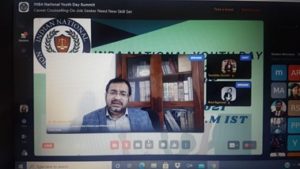
The learned speaker began by appreciating the strenuous efforts put by INBA to organize this summit on this auspicious day and also acknowledged that the topic for the session is very skillfully crafted to address the growing concerns of the audience, who are mostly students. He then pointed the specific problems faced by the students, especially during this pandemic, where everything is held virtually and students can’t approach the law firms or visit the courts. The esteemed speaker mentioned that the filtration process has been set very higher. The procedure to shortlist candidates by the firms have become tough. Now students need to gear up from the very beginning and be much more far sighted. The role of the students and specially lawyers in the society is very challenging and lawyers have always led from the front, he reiterated this and praised what Mr. P K. Malhotra had said in the inaugural session. ‘Lawyers’ can’t be ‘followers’ but have to be ‘leaders’ and with this positive attitude students should also nurture themselves.
Dr. Nachiketa Mittal further elaborated that the students should plan their career well in advanced even before approaching the third or fourth year. So, students need to develop and have a good command over their communication skills and spoken English and develop their personality apart from having legal knowledge. These skills will help the students to go over a long way. Another skill set which the learned speaker emphasized upon was to have a sound understanding about the technologies. The current pandemic is the suitable example to show that technologies help to even transcend the borders. A student having a sound understanding about technologies will have an upper edge than others in any law firms or as in-house counsels or even in the judiciary. Gracious networking and public relations management was the other skillset enumerated by the speaker, that students should practice and inculcate amongst themselves. Also, it was advised that whenever students go for the internships, they should leave a positive feedback and never say NO to any assigned task. This good practice will help the counsels from the firms to give you a next opportunity in the future. Considerable importance was also given to good publications in the reputed journals. Scholarly articles published by the students always help them to grab vast opportunities.
At the end of the session he addressed some of the questions of the students and guided them to look for the UGC recommended journals, if they want to publish their papers. Students were also advised to proofread their papers, time and again, in order to make it into a good writeup.
Ultimately, vote of thanks was given to Dr. Nachiketa Mittal.
The Video Link is accessible here.
WORKSHOP 2: LESSONS FROM LIFE
SPEAKER: Sandeep Kumar, Chief Executive Officer, Craft Beton, Dalmia Bharat Group
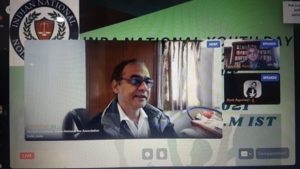
The workshop on “Lessons on Life” was conducted by Sandeep Kumar, Chief Executive Officer, Craft Beton, Dalmia Bharat Group. He’s a noted alumni of IIM Ahmedabad from where he pursued MBA. He graced the session conducted by the Indian National Bar Association on the occasion of National Youth Day on 12th January, 2021.
Every person has a journey, the path for which is meant for him to discover. As long as we move ahead and as long as we keep learning from the lessons that life give us we make our lives worth a while. Mr. Sandeep Kumar talked about the lessons that he learnt from his journey while at different stages and point of time. He reflected to the journey he had while he made choices that define his success today. The session was meant to provide students with an insight about the paradigms of life.no matter what one does in life, somethings and some lessons always help building the space for better people as better professionals. Key takeaways from this session were:
- There is more than one path in life, therefore, we must always experience things as much as possible. While exams and grades are important, but they are temporary. Students must teach themselves to question everything and seek answers to those questions and the process of learning should never stop.
- Failures are just the way towards success and one should not fret about failures and in order to turn failure in to success one must work hard. There is no substitute for hard work. While it is not all about money, somethings in life are about money. It must be understood something that does not make money is a hobby and a business needs to make money.
- The very purpose of our lives must be to find the whole purpose of live and for that we must put our heart and soul in to finding it. Trusting gut feeling is what differentiates us from animals therefore, something that comes from within must be trusted.
- It is important to be happy in what you’re doing otherwise there is no point of doing things in life. Seek happiness in your work or do something that makes you happy.
- Setting out plans and having goals really helps to stick to what and how things are to be done in a timely manner. As the time lost cannot be regained, you should always respect time, make fast decisions, set and stick to deadlines.
- Achieving perfection must not be the goal as attaining perfection ends the scope for learning and modification.
- The people one meets with make a great impact on what one becomes therefore one must surround oneself with positive people. Relationships and friendships play a vital role in our lives therefore, they must not be taken for granted.
- Words are the most powerful weapons in this world. You should find ways to make them effective and not to hurt or spread hatred amongst people.
- There always a first time and there’s always a first step-take that step, stop worrying about what’s at the end. Take one step at a time, the end, the future will dawn upon. While being on this journey called life, never compare your journey with that of others. Just remember to enjoy your own ride!
The session ended on a very positive note given by Kaviraj Sir, as he thanked Mr. Sandeep Kumar for gracing the workshop with his presence and enlightening students by sharing his lessons with them.
The Video Link is accessible here.
WORKSHOP 3: EMERGING NEW OPPORTUNITIES
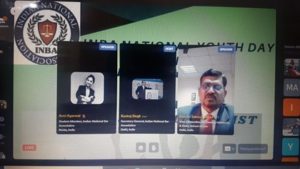
SPEAKER: Prof. (Dr.) Tabrez Ahmad, Vice Chancellor of GD Goenka University and Dean of Law
The workshop on “Emerging New Opportunities” aimed at analyzing the new work culture post pandemic situation. The speaker for the session was Prof. (Dr.) Tabrez Ahmad, Vice Chancellor of GD Goenka University and Dean of Law. He is a doctorate in Cyber Law and IPR from Aligarh Muslim University.
The pandemic situation has put the world in a fix to actually fix the things that have gone wrong due to the pandemic itself. A lot has changed since the pandemic has hit the world. With all the physical distancing that has come our way, a shift in work culture has been seen. The post Covid situation has resulted in a shift towards online working and the usage of social media, online business meeting apps, online education has increased. To be more precise, it is basically the use of technology, Artificial Intelligence, virtual realities that has seen the surge thereby increasing the use of databases.
Prof. (Dr.) Tabrez Ahmad talked about all such possibilities that might emerge in the field of law and legal studies. He also talked about the future course for Legal practice and with regard to ongoing online hearing of cases. The following was discussed during the workshop:
- The shift towards online working has increased the use of data and a new market for databases has emerged. One problem associated with data dependent market is that it has led to sharing of information a necessity thereby invading privacy of people. There is an increasing threat of violation of privacy. Quite recently, the Government of India has banned around 200 applications that were a continuous threat to privacy of public at large, thereby making the question of cybersecurity important.
- The pandemic was made survivable due to existence of internet (all thanks to the technological advancements made). Legal Market, specifically, has changed a lot. The tasks of drafting, collecting evidences, hearing cases online has not only changed the scenario for lawyers but also for judges.
- Advancements in technology coupled with the pandemic situation has completely changed the legal profession. As regards with collection of electronic evidence, the Information Technology Act, 2000 provides validity to evidence in electronic form. It has become easier to find previous judgements with a click of a button and sometimes also interpret the judgement in a case similar to the one already decided in the court of law.
- Online journals have also made their way through the market that did not even exist before.
- Talking about the challenges that have posed now are that there is a need provide trainings for high tech lawyers to deal with cybercrime cases. Lawyers must learn and adjust to these technological advancements.
- Advancement in internet services from 1G to 4G has made collection of evidence a time friendly and economic process. It is also said that with the new 5G services a 1 hour video could be downloaded in few seconds, thereby saving time and money.
- Dispute arising and settlement has also become cheaper with the ODR process that makes the entire process of resolving disputes easier through the use of electronic communications.
- With these new emerging opportunities, some jobs have or are on the verge of becoming obsolete like the jobs that require typing of documents.
The workshop aimed at providing a clear idea about the shift in pattern of working with respect to legal profession, the new opportunities that might emerge in near future and how it is going to change the scenario for lawyers and judges.
The Video Link is accessible here.
WORKSHOP- 4: EMERGING TRENDS AND DEVELOPMENT IN EDUCATION
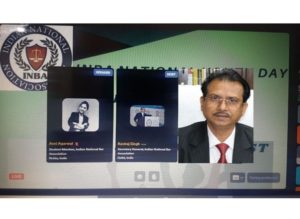
SPEAKER: Prof. Dr. Dilip Ukey, Vice-Chancellor, MNLU Mumbai
The session started with a brief introduction of the speaker, namely, Dr. Dilip Ukey. Dr. Ukey completed his LLM in 1991 from Nagpur University and has been awarded by University Grant Commission. He pursued his research in the area of Constitutional Law, Jurisprudence, and Human Rights. He has the distinction to be the first and only candidate in the University with the fellowship.
Dr. Ukey started the session by highlighting the importance of Youth Day and by paying respect to Swami Vivekananda, the youth icon who contributed significantly in terms of philosophy, moral values, dharmasastra and swaraj and particularly about the youth. Discussing the emerging trends in education and development of youth, Dr. Ukey emphasized the fact that India is having the biggest youth population all over the world. He mentioned that having an abundant youth population is rather the biggest asset for the nation. Keeping in mind the population of working youth in India, he envisaged that this is the reason that it is expected that India might take number three in terms of the development of the economy.
Dr. Ukey highlighted the fact that education is the key to success, education is the power and it is the basic foundation of nation-building. Further, he focussed on how education enables the youth in India. Dr. Ukey rightly pointed out that ‘Young minds are energized and Youth stands for dynamism and energy’. The kind of ideas, energy, creative advancements, that flows from youth in the field of education leads to some kind of innovations.
Looking at the advancements or emerging trends in the education sector, Dr. Ukey asserted that the New Education Policy has been introduced. As per the policy, all the central bodies have to be merged into one higher education commission. Such commission would be centralized and under that higher education commission, the functions would be then operative. However, he underlined the fact that the two sectors namely, legal and medical education have been kept aside from the purview of the higher education council. The words of Dr. Ukey were quite motivating. He emphasized that law is a field that consists not only the traditional advocacy but rather the word is open for lawyers. Arbitration, Mediation, Corporate sector, Maritime, Air, Space, Science, Technology, Biotechnology, Policy, and Law are several emerging avenues which requires scientific and analytical approach and certainly in such areas the orthodox approach would not suffice for the purpose of legal education.
Dr. Ukey enlightened the attendees by discussing that what is needed now is the whole comprehensive approach wherein new avenues are opened up where the law students can make their career. ADR mechanisms are the future and are certainly seen as an emerging trend. The same is evident from the recent trends, from the apex court’s decision of making a mediation committee to the amended consumer act having an express provision of compulsory mediation in the consumer forums. In lieu of this, legal education has to take into account all these emerging trends where the law students can learn new things instead of relying on the traditional way of lawyering and learning.
Talking about youth development and emerging trends in education, Dr. Ukey pointed out that no doubt knowledge is the power, but it can also become a double-edged weapon, meaning the power could be misused or abused. Hence, he stressed the fact that although it is well-accepted fact that there is a need to make an innovative based society, however, value-based education is also important for one. Nation-building must also include the basic human values of dignity, the value of self-respect, and self-esteem. According to his intellectual views, not only knowledge-based education but value-based education must also be given.
Dr. Ukey rightly pointed out that ‘Before reconstruction, there must be deconstruction’. He mentioned that even the preamble of the Constitution of India upholds the values. Fraternity and assuring the integrity of individuals and the unity and integrity of the nation is what our constitution guarantees. He focused on the fact that no development is possible without adhering to basic human values. Dr. Ukey left the attendees to ponder upon the question that are we educated. Being a part of a nation and contributing to its growth, youth must assure the notion of fraternity and adhere to assuring the dignity of individuals.
The session concluded with great learning that one may become successful in different avenues, judge, lawyer, professor, or a corporate attorney but what is important is that how one becomes a good human being in a liberalized and civilized society.
The session ended with a vote of thanks.
The Video Link is accessible here.
WOKSHOP- 5: JUDICIARY EXAMS PREPARATION
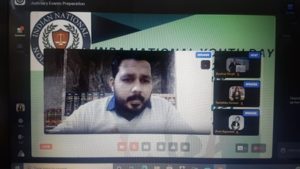
SPEAKER: Mr. Zia-Ul Mustafa Ansari, Founder of Zia Judicials
The session started with a brief introduction about the speaker, namely, Mr. Zia-Ul Mustafa Ansari, founder of Zia Judicials. Mr. Ansari started with Zia Judicials in September 2017. Zia Judicials is recognized as one of the leading Judiciary Coaching Institutes in Delhi. Mr. Ansari is not only a perspicacious leader but also a successful young educator.
Mr. Ansari started the session by discussing the hot topic of Civil Judge Junior Division having 3 years of experience in the lower judiciary. He advised the attendees to come out of this half information. This view has been given by the Bar Council of India and the same will have no impact/implication at present. Earlier there was no experience required for the Judiciary examination. Generally, if a person has qualified LLB, irrespective of the fact that one is enrolled or not, he/she was eligible to be a civil judge lower division.
Mr. Ansari shared the in-depth knowledge of the civil judge junior division examination. Firstly, he mentioned that this is the lowest carder of the Judiciary. Secondly, this examination is a state-wise examination. India has 29 states, each state has its notification. Out of these states, 10-11 states are Hindi based, which means their language in which examination is conducted in Hindi, however, the remaining states are language-based.
E.g., Tamil Nadu, West Bengal, Punjab requires their regional languages to be tested.
He enlightened the attendees with the fact that generally, people who are aware of the Hindi language are eligible to appear for this examination in 10 states. Mr. Ansari thoroughly explained the difference between UPSC and Judiciary examination. Unlike UPSC, in Judiciary one can give a minimum of 10 attempts in one year as each state can give its notification every year. He mentioned the reasoning behind the same that the notifications are issued as this is the order by the Apex court that each state must come out with vacancies every year. He pointed this to be one of the benefits of appearing in Judiciary examinations.
Mr. Ansari without leaving a room for doubt discussed about the examination. He shared that civil judge junior division being a state examination involves variation in the syllabus according to the respective state. Local laws are involved but most of the subjects are general. For example, CPC, CrPC, Evidence, TPA, Indian Contract Act.
Mr. Ansari further covered the pattern of examination. Civil Judge Junior Division examination is divided into 3 phases. The first being the preliminary examination which is objective type, followed by Mains examination and final interview.
Preliminary Examination: The preliminary examination is an objective type exam. He shared that the objective type means a question having 4 options, out of which 1 option is correct. On choosing the right option, 1 mark is scored, whereas on attempting the wrong question, negative marking is given. Generally, 0.25 or 1/4th mark is deducted in negative marking. However, if the question is not attempted, no marks are allotted. This examination is a qualifying exam and is not added to further examinations. This makes one qualified for appearing in Mains (the second stage), but as the exam involves negative marking, Mr. Ansari advised that one should be peculiar about the answer and then choose thereafter. Furthermore, giving the example of Delhi, he explained that out of 125-marks paper, the cut-off in the preliminary examination is 110 or 111.
Mains: Mains is similar to the semester examination. The syllabus of the mains exam varies from state to state. The exam is conducted under the four papers:
PAPER I – GK AND LANGUAGE (150 M or 250 marks varying state to state)
This involves questions on legal updates, law and society, basic grammar English, and translations from Hindi to English or English to Hindi.
PAPER-II – CIVIL LAW I (200 M)
Question-based on Indian contract act, Indian sales of a good act, Indian partnership act, Specific relief act, Hindu law, rent control act or Law of torts
PAPER III – CIVIL LAW II (200M)
Civil Law 2 is optional and depends upon the state to state.
It involves subjects like Contract, Transfer of Property Act, Family, Sales of Goods Act, Registration Act, and Indian Partnership Act, Civil Procedure Code, Law of Evidence, Law of Limitation and Law of Registration
SECTION 4 – CRIMINAL LAW (200M)
It involves questions based on the Criminal procedure code, the Indian Penal Code, and the Indian evidence act.
NOTE: Minimum marks are 40% in each written paper and an aggregate of 50% to qualify for an interview. Relaxation of 5% each has been made for SC/ST/PWD.
At least 350 marks are required out of 850 to become eligible for the 3rd stage.
The interview: The interview will carry 150 or 200 marks. Need to score at least 50% (relaxation by 5% for RC) to qualify. The aggregate of the marks obtained in both interview and written exam will determine the position. One has to appear before Panel. The panel consists of academicians, persons from renowned colleges, Judges of an HC, etc.
When one should prepare for the examination?
Mr. Ansari also discussed the most important question as to when one should prepare for the examination. He advised that one should start their preparation from the first semester. He guided the attendees that one must be aware of the syllabus of at least one state and get themselves through that particular subject in the semester which they would study a particular subject. He also advised preparing notes for those semester subjects.
However, Mr. Ansari emphasized that one must fully dedicate and prepare seriously after the 7th semester as till then the appearing candidate must have studied all basic laws and got the understanding of the concepts of law, done moot courts, research papers.
How can one prepare for the examination?
Mr. Ansari discussed the key points for preparation. He mentioned that one must remember that the civil judge junior division is the lowest grade examination and at this stage, there is no requirement for practice. One is not required to read commentaries, full-fledges extensive books, rather as suggested by him, the best way to prepare is by pursuing bare acts, reading the landmark judgments and any book of that particular subject
How to prepare for MCQs or Mains?
After following the aforesaid steps, he suggested that is essential for one to practice MCQs. He recommended the book namely, ‘Universals Publication” that one must have at the initial stage.
Additionally, Mr. Ansari pointed out that when one is writing answers for mains, he/she should be very peculiar. He suggested the aspiring candidates read the Delhi Examination Solved Paper of preceding years to get a basic idea.
Lastly, on clearing one of the queries in the Q&A session, he advised that if one has started the preparation at early years, then LLM preparation or practice could be managed simultaneously, However, if one is preparing in his/her last year, in that case, Mr. Ansari advised to first complete the syllabus and basic preparation, following which LLM preparation can be taken up. Staring LLM preparation and judiciary simultaneously will make no progress. He suggested that basic understating of law would help in practice as well as the examination.
The session ended with a vote of thanks.
The Video Link is accessible here.
WORKSHOP 6: CONFLICT MANAGEMENT
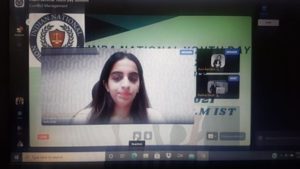
SPEAKER- Ms. Divya Mohindroo Kashyap, Co-Founder, Embrace Imperfections
This session began at 5:30 p.m. and addressed the pertinent issue of “Conflict Management”.
The speaker of the session was Ms. Divya Mohindroo Kashyap, who is the co-founder of Embrace Imperfections. Embrace Imperfections is an organisation whose mission is “to raise awareness, promote advocacy against social stigma, empower individuals and encourage better education regarding mental health issues.”
Ms. Kashyap begun the session by distinguishing between being assertive and being aggressive. Being assertive means being responsive, clear and firm in your opinions. Being aggressive means being reactive, agitated and rude. Ms. Kashyap underlined the significance of being assertive with respect to one’s opinion. She emphasized upon the importance of understanding one’s anger. To understand one’s anger it is significant to focus on one’s emotions and thoughts and to look past the issues. It is also important to avoid the impulse in order to cut off. In a state of conflict, one should use “I” statements. Using such statements helps to communicate about yourself rather than talking about others. Such statements are a simple way of talking about your thoughts. She emphasized upon showing empathy and not sympathy. She distinguished between empathy and sympathy. Empathy means understanding the problem of other and sympathy means feeling bad about other’s problems. In order to minimize the conflict, one should demonstrate appreciation and admiration. One should seek out the positive in the other and practice kindness free from judgement and invite calm and clarity in one’s life.
Furthermore, stemming from the utilization of “I” statements, one should avoid using phrases starting with “you”. She gave illustrations of various “You” phrases such as “You always” or “You never” or statements such as “You are too sensitive” or “ You are so egoistic” etc. Ms. Kashyap also pointed out a pertinent point when she said that one should take note of other’s fears, biases, traumas etc. while arguing. She underlined tips with respect to conflict resolution at work. One must not be the loudest person in the room to command respect and recognition and it is important to build mutual respect with your team by knowing what motivates them. She also brought light to various conflict resolution management techniques such as withdrawing from the conflict and compromising during the conflict. Lastly, she said if one avoids a conflict to keep peace, he/she starts a war inside himself/herself.
The Video Link is accessible here.
WORKSHOP 7: ART OF PUBLIC SPEAKING
SPEAKER: Mr. Per Oberg, Director, Swedish National Chamber of Commerce
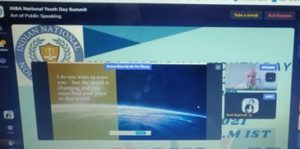
This session began at 6:00 p.m. and addressed the pertinent issue of “Art of Public Speaking”.
The speaker of the session was Mr. Per Oberg, who is the member of Stockholm Chamber of Commerce, & Member of Sweden India Business Council& Consult Sweden-On-The-Go. Public speaking refers to giving speech face-to-face to live audience. It is an important life skill and requires great amount of hardwork to master. Attitudes among people depend upon what one says therefore one, while speaking in the public domain, must speak with responsibility. This can be understood with the present situation of pandemic, the question of effectiveness of vaccine has been put to doubt by a lot of people contending that the vaccine has a lot of side effects. People tend to believe to what others say instead of relying on facts. Easy access to internet has also posed as a challenge as it has become extremely easy for people to connect with a wide range of audience spread nationally as well as internationally.
Mr. Per Oberg talked about climate change and how it has had a huge effect on the agriculture. The variation in weather and the amount of rainfall received by an area affects the number of species. For instance, the insects have to pollinate so we get fruits and vegetables and that might get interrupted if the number of insects decrease to great extent. The effect of climate change can have a grave impact on the food chain in future. Climate change has also led to the problem of water scarcity. More and more places will not be inhabitable in few years due to abandonment of places because of water scarcity. This will be one of the major reasons for migration. Survival will become one of the main problems for humans in future.
Another aspect for survival is the concept of business. Issues such as how will the business change or which business will work in future? are of important consideration. Countries have, after this pandemic situation, reposed faith in their local businesses thereby practicing self-sufficiency.
Mr. Per Oberg also attempted to compare the challenges that India faced before the pandemic and challenges that India might face after the pandemic along with answering the questions such as, “How to identify legal challenges and handle them” and “what will be the political and legal status of India”. Mr. Oberg also advised students to analayse the ideas, challenges, weaknesses and strengths of the domain they wish to work in and plan and make new strategies to overcome those challenges.
The Video Link is accessible here.
LEGAL ARTICLE PRESENTATIONS
After the workshops, the students submitted their research articles presented their ideas and suggestions on the themes of Police Reforms and Cyber Crimes for the summit this year.
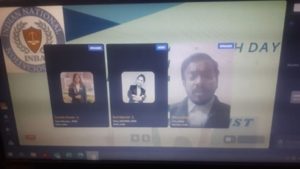
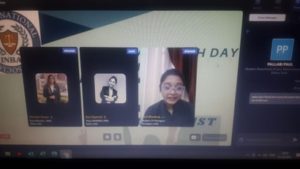
The Video Link is accessible here.
The session ended with a note of thanks by Ms. Vinakhsi Kadan, Senior Advisor, INBA.

